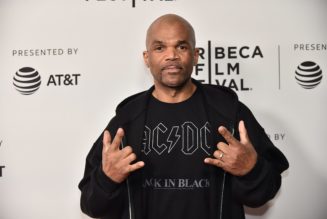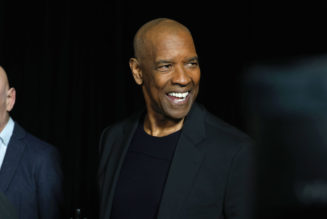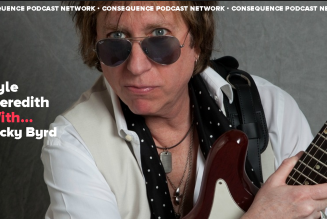
“There is some kind of a misconception where people assume if you’re taking drugs, or you’re drinking a lot, that you have some sort of demon or you’re in a dark place,” Sum 41’s Deryck Whibley says, “But so often, it just isn’t like that”.
Whibley is an open book about his struggles with his physical health, his mental state and addiction. The music industry tends to shy away from nuanced conversation about the complicated intersection of drugs, alcohol and the pressures of the road. Whibley is starkly up-front, willing to frankly discuss the issues that have tried to drag him down — and the means he found to instead stand tall.
For Whibley, that story goes all the way back to just after 2011, with the release of Sum 41’s sixth record, Screaming Bloody Murder. With a fresh and new record, Whibley was relishing the opportunity to take the songs on the road and to do the work associated with supporting an album. But suffering from back problems stemming from a herniated disc, drinking became a well-utilized tincture to ease Whibley’s agony.
“I was actually a really positive person,” Whibley says, “I really enjoyed my life and I was having a good time. But I was in a lot of physical pain and we were on tour. I didn’t really stop to take care of myself. I didn’t really look at that as even an option. I found that if I had a couple extra drinks than I normally would, well, all the pain would kind of go away. It was the first time I ever found myself drinking when I didn’t feel like drinking. I was doing it to help with pain management.”
[embedded content][embedded content]
While the offer of pills and other methods of pain management were there, Whibley was wary of taking over-the-counter medication to help manage the pain — not wanting to find himself ensnared in the world of opioids and other heavy drugs.
“I thought, stupidly, ‘Well, I’m not going to die from drinking.’”
A combination of the volume of alcohol and sheer amount of time spent consuming it grabbed hold of Whibley. The band was already known for partying hard while on the road, but the combination of using alcohol to manage pain and the rockstar lifestyle proved too much. While he didn’t feel mentally addicted to drinking, his body became dependent on it.
“I was already a heavy drinker, we all were,” Whibley says. “We were still at a young enough age to maintain ourselves. We were very functional, but there were concerns at certain points, because it kind of started to go off the rails a little.”
Even as the train started to leave the tracks, few in the Sum 41 camp offered support about the increase in alcohol consumption.
“People were coming to me, but we weren’t really dealing with it the way that we should,” Whibley recounts. “It didn’t come from a sort of caring or compassionate place. It was a very accusatory, aggressive, angry kind of thing. It kind of created a rift in our band and resentment from both sides. We were just sort of imploding at the same time.”
Piling on the destruction were Whibley’s own mental health struggles. His anxiety and panic attacks had been on and off — often exacerbated by stressors like his much publicized divorce from Avril Lavigne in 2009 — and he turned to drinking to quell the feelings instead of managing them head on. But this, much like drinking to manage his physical pain, was not a salient solution.
[embedded content][embedded content]
“When alcohol starts wearing off, it creates a lot of the same feelings that cause panic and anxiety in the body,” Whibley says. “I was getting worse panic attacks and I was drinking to cover those up. I would hurt my back again and I was drinking to cover that up. It was just a cycle.”
All these roads converged in 2014, when Whibley landed in the hospital with liver damage from sustained excessive drinking. His April and May fell away in a hospital bed, and he was released as an outpatient for June and July. His time in the hospital had a lasting effect on him, and he struggled to readjust to life outside of a hospital bed — particularly when he wasn’t sure if he’d even survived the ordeal in the first place.
“It was touch-and-go there for a while,” Whibley says of his health at the time. “The doctors were very open and honest, it was a 50/50 chance that I would survive it. I knew if I ever got out of there that I wasn’t going to let it go. It puts into perspective what you really care about, and all I could think about in the hospital was music.”
The music industry is intrinsically linked with the image of the eternal rockstar attached to a mostly empty bottle of Jack Daniels as the unwitting symbol of rock and roll. Whibley wondered what it meant to his sense of self as a musician if he no longer drank and partied the way that he had for so long. So he reached out to someone he knew could offer guidance on a new road: Iggy Pop.
“He said ‘The first thing you need to do is to forget who the fuck you think you are and get back to the person who you really are,” Whibley says of his call with the punk legend. “In that instant, I knew exactly what he meant. It is my identity, and I am the person who does this. It all hit me in a flash. From that point on, I never looked back.”
[embedded content][embedded content]
Now 8 years sober, Whibley prepares to release a new Sum 41 record. They’ve crafted a double LP (a first for the band) titled Heaven And Hell, which deftly threads a line from their early pop punk days to their current metal era. The first disc, full of songs harking back to the golden age of ‘00s pop punk, was written in the wake of a proposed deluxe-reissue of their debut LP, All Killer, No Filler. Universal Records asked Whibley if they had any songs leftover from their early days. He didn’t, but the challenge presented itself to come up with one or two.
Before long, Whibley had written enough songs to make a record and opted to collect them all as a new record instead of extras on a nostalgic repackaging. At the same time, he had been writing new material that was much more of-the-moment for Sum 41, a band that has moved away from the pop punk songs of their youth into heavy metal arenas.
With the advent of a new record, there’s also a tour with fellow Canadian pop punk icons Simple Plan. But the road can prove challenging to someone keeping their sobriety in check.
“There’s no right or wrong way or right or wrong answer,” Whibley says of his self-preservation tips for the road, “It’s just whatever works for the individual.”
Over time, Whibley realized that one secret to his recovery while on the road is to allow the other members to carry on like before. He doesn’t regret the time he spent partying as a young man, but — now a more mature married father — he’s not exactly envious of the colleagues he sees getting drunk while out on tour.
“I find that it helps me in some ways, because I’ve never once — not one single time — looked at the other guys being drunk, seen what they’re talking about and said ‘Man, I wish I was a part of that,’” Whibley laughs. “I look at it and go ‘Fuck, man. Thank god I’m sober and I’m not in that conversation.’”









Tagged: addiction, sum 41